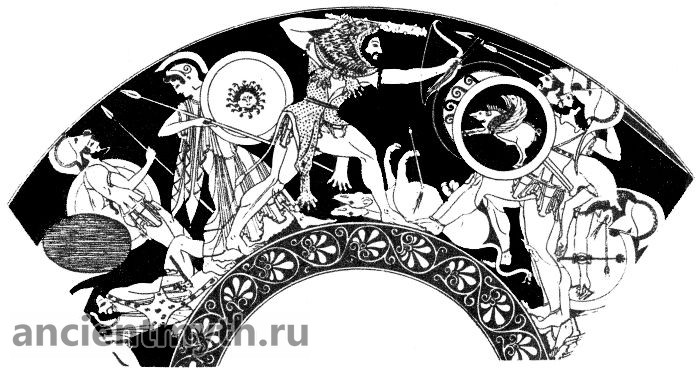Cows of Geryon (tenth feat)
Shortly after returning from a hike in the Amazon country Hercules went to a new feat. Eurystheus instructed him to bring to Mycenae the cows of the great Geryon, the son of Chrysaor and oceanides Kalliroi. It was a long way to Geryon. Hercules had to reach the westernmost edge of the earth, the places where the radiant sun god descends from the sky at sunset Helios. Hercules went on a long journey alone. He passed through Africa, through the barren deserts of Libya, through the countries of savage barbarians, and finally reached the limits of the earth. Here he erected on both sides of a narrow sea strait two giant stone pillars as an eternal monument about his feat.
Hercules had to wander a lot after that, until he reached the shores of gray Ocean. In thought, the hero sat down on the shore by the ever-noisy waters of the Ocean. How was it possible for him to reach the island of Erifei, where Geryon grazed his flocks? It was late afternoon. Then the chariot of Helios appeared, descending to the waters of the Ocean. The bright rays of Helios blinded Hercules, and an unbearable, scorching heat enveloped him. Hercules jumped up in anger and grabbed his formidable bow, but the bright Helios was not angry, he smiled affably at the hero, he liked the extraordinary courage of the great son of Zeus. Helios himself proposed to Hercules to cross to Eriphaia in a golden canoe, in which the sun god sailed every evening with his horses and chariot from the western to the eastern edge of the earth to his golden palace. The overjoyed hero boldly jumped into the golden canoe and quickly reached the shores of Erieia.

At the feet of Hercules lies the two-headed dog Orpho,
behind Geralk are the goddess Athena and Iolaus,
at their feet lies the murdered giant Euryton.
(Drawing on a vase.)
As soon as he landed on the island, his formidable two-headed dog smelled him Orpho and rushed at the hero barking. Hercules killed him with one blow of his heavy club. Orpho wasn't the only one guarding Geryon's herds. Hercules also had to fight with Geryon's shepherd, the giant Eurythion. The son of Zeus quickly coped with the giant and drove Geryon's cows to the seashore, where the golden canoe of Helios stood. Geryon heard the lowing of his cows and went to the herd. When he saw that his dog Orpho and the giant Eurytion had been killed, he chased the thief of the herd and overtook him on the seashore. Geryon was a monstrous giant: he had three torsos, three heads, six arms and six legs. He covered himself with three shields during the battle, he threw three huge spears at once at the enemy. Hercules had to fight with such a giant, but the great warrior Athena-Pallas helped him. As soon as Hercules saw him, he immediately shot his deadly arrow at the giant. An arrow pierced the eye of one of Geryon's heads. The first arrow was followed by the second, followed by the third. Hercules menacingly waved his all-destroying mace like lightning, the hero of Geryon struck it, and the three-bodied giant fell to the ground like a lifeless corpse. Hercules transported the cows of Geryon from Eripheia in the golden canoe of Helios across the stormy Ocean and returned the canoe to Helios. Half of the feat was over.
A lot of work was still ahead. It was necessary to drive the bulls to Mycenae. Hercules drove cows all over Spain, through the Pyrenees Mountains, through Gaul and the Alps, through Italy. In the south of Italy, near the city of Regium, one of the cows broke out of the herd and swam across the strait to Sicily. There the tsar saw her Eryx, son of Poseidon, and took the cow into his herd. Hercules searched for a cow for a long time. Finally, he asked god Hephaestus to guard the herd, and he crossed to Sicily and there found his cow in the herd of King Eric. The king did not want to return her to Hercules; hoping for his strength, he challenged Hercules to single combat. The winner was to be rewarded with a cow. Erix could not afford such an opponent as Hercules. The son of Zeus squeezed the king in his mighty arms and strangled him. Hercules returned with a cow to his herd and drove him on. On the shores of the Ionian Sea goddess Hera sent rabies to the whole herd. The mad cows scattered in all directions. Only with great difficulty did Hercules catch most of the cows already in Thrace and finally drove them to Eurystheus in Mycenae. Eurystheus sacrificed them to the great goddess Hera.